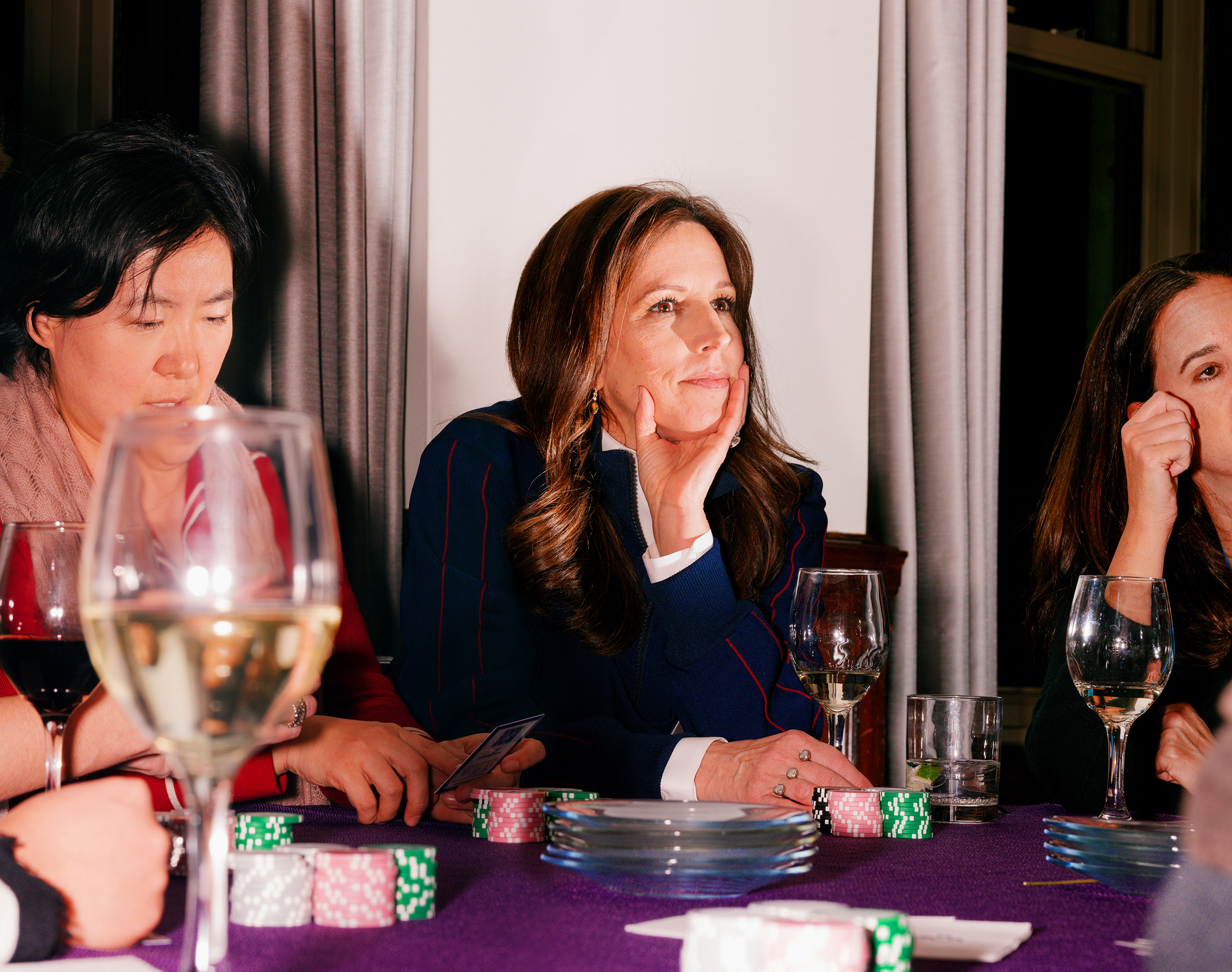Jenny Just is a legit self-made billionaire. She won’t say how many billions, but calls a 2022 estimate of one and a half of them “conservative.” You haven’t heard of her, because until now, she’s had no reason to be out in public; with four kids and four companies, she likes to say, she has had plenty to keep her occupied. Plus, rich people often feel safer with a low profile. But during the pandemic, when her already substantial wealth blew up alongside the number of companies using a financial technology platform she and her husband created, she found a cause close enough to her heart to make her step into the limelight. Weirdly, it’s poker. Specifically it’s teaching 1 million women and girls how to play Texas Hold’em.
On the list of challenges that most people acknowledge women are facing in the second quintile of the 21st century—from being shut out of corporate boardrooms to untreated fistulas—the inability to play Texas Hold’em does not rank very high, but Just is all in. Since 2020, she has started a company, Poker Power, hired a staff, woven together a network of female instructors, built an app, bankrolled a number of high-profile events, and introduced about 32,000 women and girls to poker across 40 countries from Monaco to Kenya. “I’m not saying [poker] is the be-all and end-all,” she says. “But if women don’t get in positions of power, all those other things are going to continue to happen. And if you don’t understand the money and how you as an individual tie back to it, you’re not going to sit in that seat of power.”
Just, 55, believes it’s no accident that the gender breakdown among competitive poker players and options traders is pretty similar: less than 10% women. She started her career as an options trader and has had a close-up view of how women perform in high-pressure situations as she has tried to hire them into her investment firm, Peak6. She has noticed two main shortcomings: they’re extremely risk-averse and they’re poor at capital allocation. That is, they lack the confidence to make the calls on when and how much to invest when they don’t have all the information in front of them. “I can see it when I try to bring them in for trading. I can see it when I listen to them trying to raise money for investments,” says Just. “The biggest weakness for women has been around money.”
More from TIME
Some research bears out the overlap between poker skills and cognitive skills common among people who are successful investors. There’s an all-star lineup of trading titans who play poker seriously, from billionaire investor Chamath Palihapitiya, whose podcast is often devoted to poker, to Greenlight Capital’s David Einhorn, who has won more than $5 million at poker tournaments. And it’s not just moneymen; President Nixon funded his first political campaign with his poker winnings. It’s how President Eisenhower paid for his first uniform. “For people who are good at the game, poker is not gambling,” says Annie Duke, who, after winning more than $4 million in professional poker, now writes books on decision management and serves as a consultant to finance companies. “There is an interaction between the way you choose to play the hand and what the return on investment would be.”
In Just’s mind, poker mirrors the options market, where you have imperfect amounts of information, but you invest on probable outcomes, and then change your strategy as more information comes in. Options trading, she admits, isn’t an automatic ticket to power, but it’s a useful skill, and one that she has worked hard to introduce to more women. “I tell women, ‘You don’t have to be a trader the rest of your life. But if you can understand options, you can sit at any table in any industry, in any position, and understand what’s going on with the money. And that’s where all the decisions are.”
Just is familiar, as are all executive women, with the statistical glitch wherein more women than men get bachelor’s, master’s and PhD degrees than men, and almost half of the MBAs, but the C-suites are still dominated by men. She puts it down—mostly—to a confidence gap. “My goal is to get girls learning before that first rung on the ladder, where the guy already has comfort taking the risk for the next job,” she says. The way to build confidence, she believes, is to play at taking risks. “The world is going to change and evolve. I just don’t want women in the backseat,” she says. “They are going to have to take risks with things.”
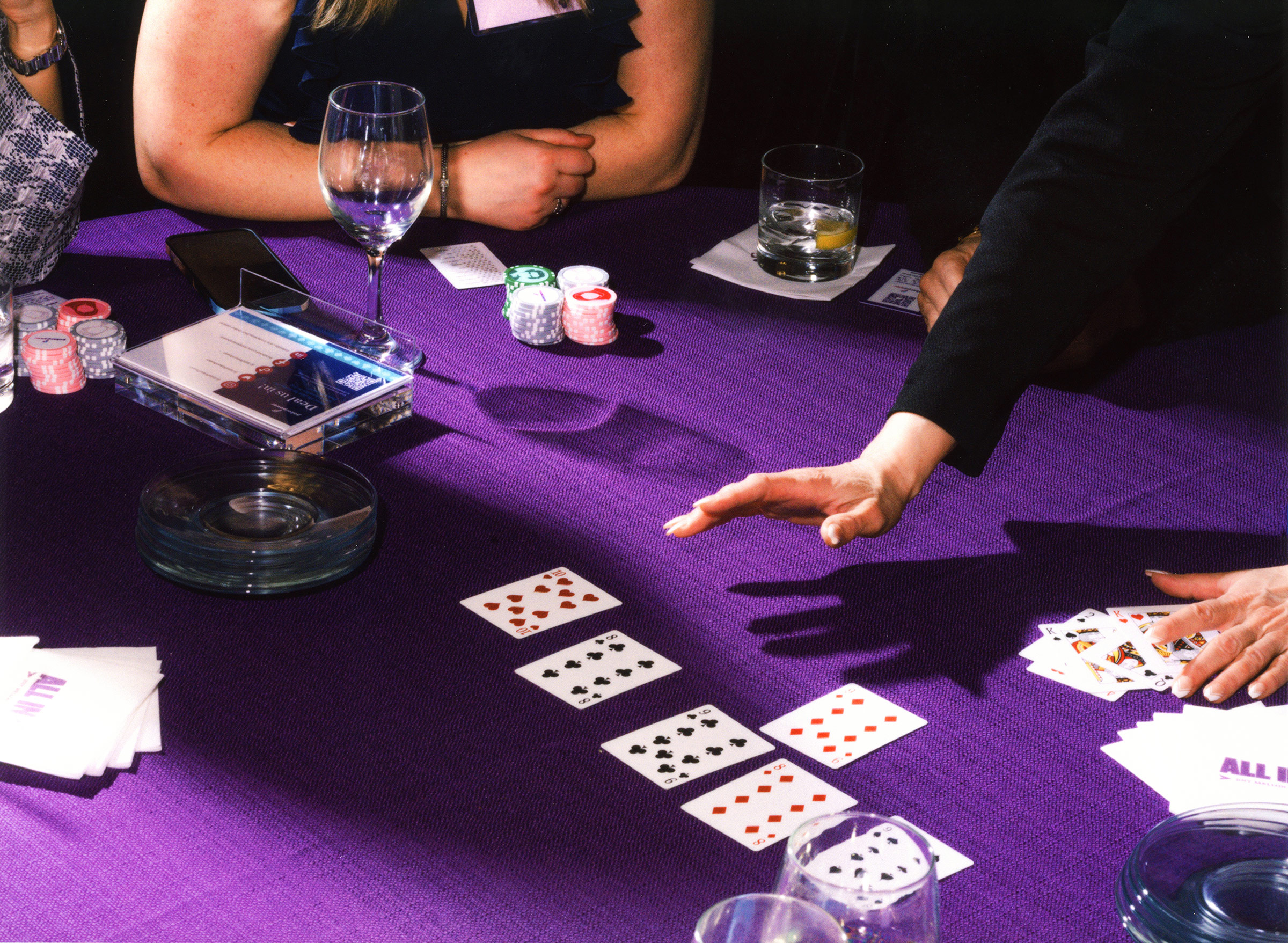
The Milwaukee-born financier rose to success without the benefit of poker—but with a decent amount of risk. A math whiz, she scored a job at the secretive Chicago-based financial firm O’Connor & Associates right out of college after the interviewer asked her to do a complicated equation in her head and she nailed it. (“Luckily I had a morning interview,” she laughs.) The only daughter in a Catholic family of seven, she thrived on the male-dominated trading floor, and after a flood in 1992 pushed a lot of employees into a room that still had electricity, her skills caught the eye of O’Connor’s celebrated quant, Clay Struve, who took her under his wing. “She has a rare skill set and rare experience,” says Paul Rowady, a former O’Connor colleague who is now head of research at Alphacution, referring to the training the firm gave employees. “A woman in a male-dominated trading business that’s based on mathematics and computer automation; she speaks a different language than most women.”
After O’Connor, which had been bought by Swiss Bank, announced in 1997 that it was moving the options division to the East Coast, Just and another employee, Matt Hulsizer, decided to stay in Chicago, and build another one, Peak6, and about six years after founding the firm, get married. Their pedigrees and their novelty—“I think at that point, it was interesting to get a call from a female,” she says—got them into a lot of rooms. Peak6 grew fast (net revenues were $14.5 million in 1999 and $80.2 million in 2000) and became a holding company for a bunch of other enterprises they bought or started, including an online trading platform called OptionsHouse.
In 2012, at the suggestion of the SEC, Peak6 bought the firm that OptionsHouse used as a clearing company, which was on its way to bankruptcy. Just and Hulsizer rebuilt the software and the resulting company, Apex Fintech Solutions, now manages a section of the digital corridor through which many squillions of online trades take place, a thoroughfare that became exponentially busier amid the pandemic restrictions. Peak6 also operates a fund of its own money, which in May reported assets under management of $20.8 billion.
In 2021, Apex attempted to go public with a SPAC (partly organized by former Cosmopolitan magazine editor Joanna Coles) that would have valued the company at $4.7 billion, but canceled the transaction amid regulatory complications over its crypto holdings. When pitching the deal, Just told JPMorgan that Apex worked with 15 million accounts, $100 billion in assets, including 2 million crypto accounts (which it has since sold), and with 200 e-trading sites including Webull, Stash, Ally, and SoFi as clients. “Jenny is Michael Jordan,” said her husband during the webcast, adding that he felt like Scottie Pippen. “I’m a really good player, but I happened to play with somebody a lot better than me.”
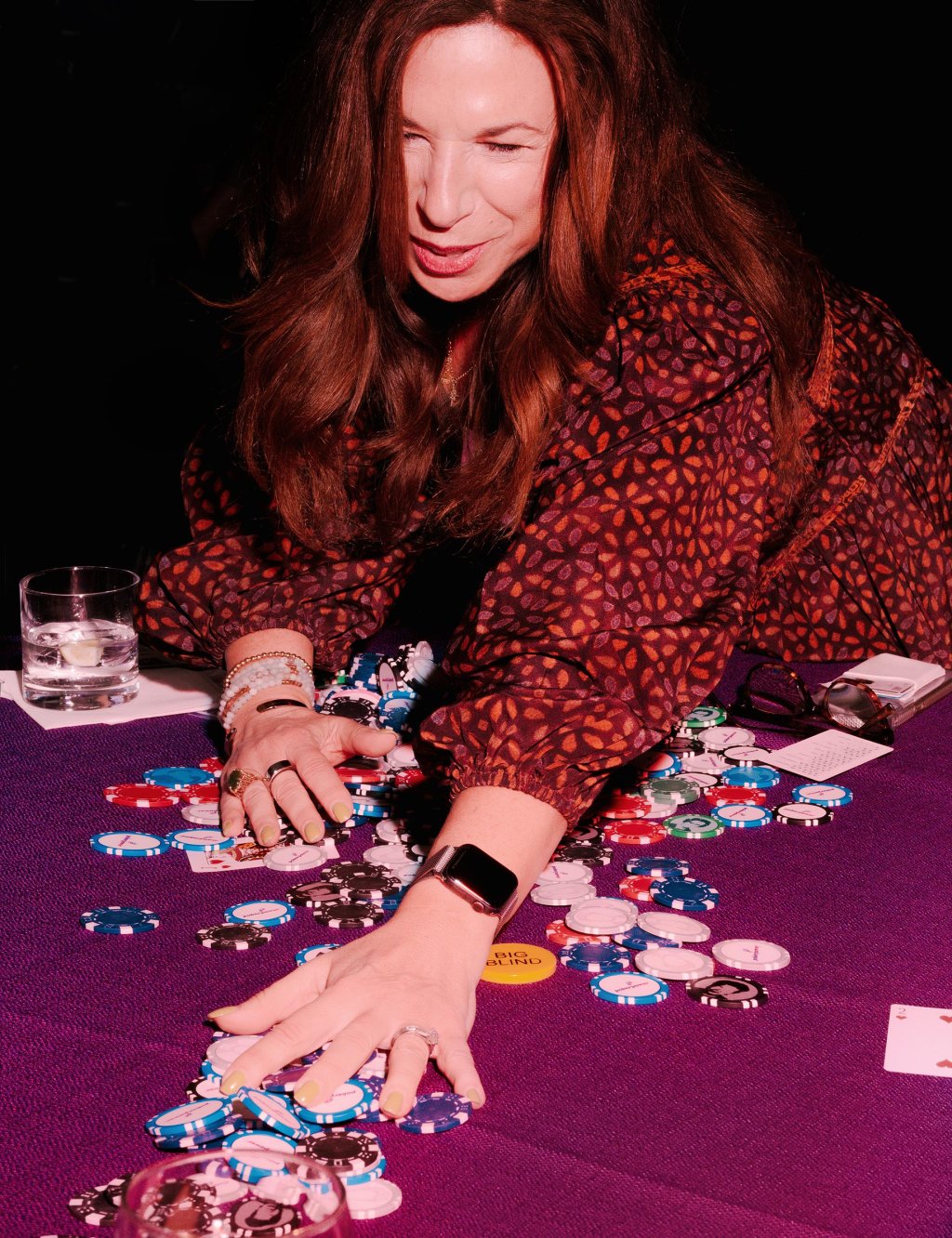
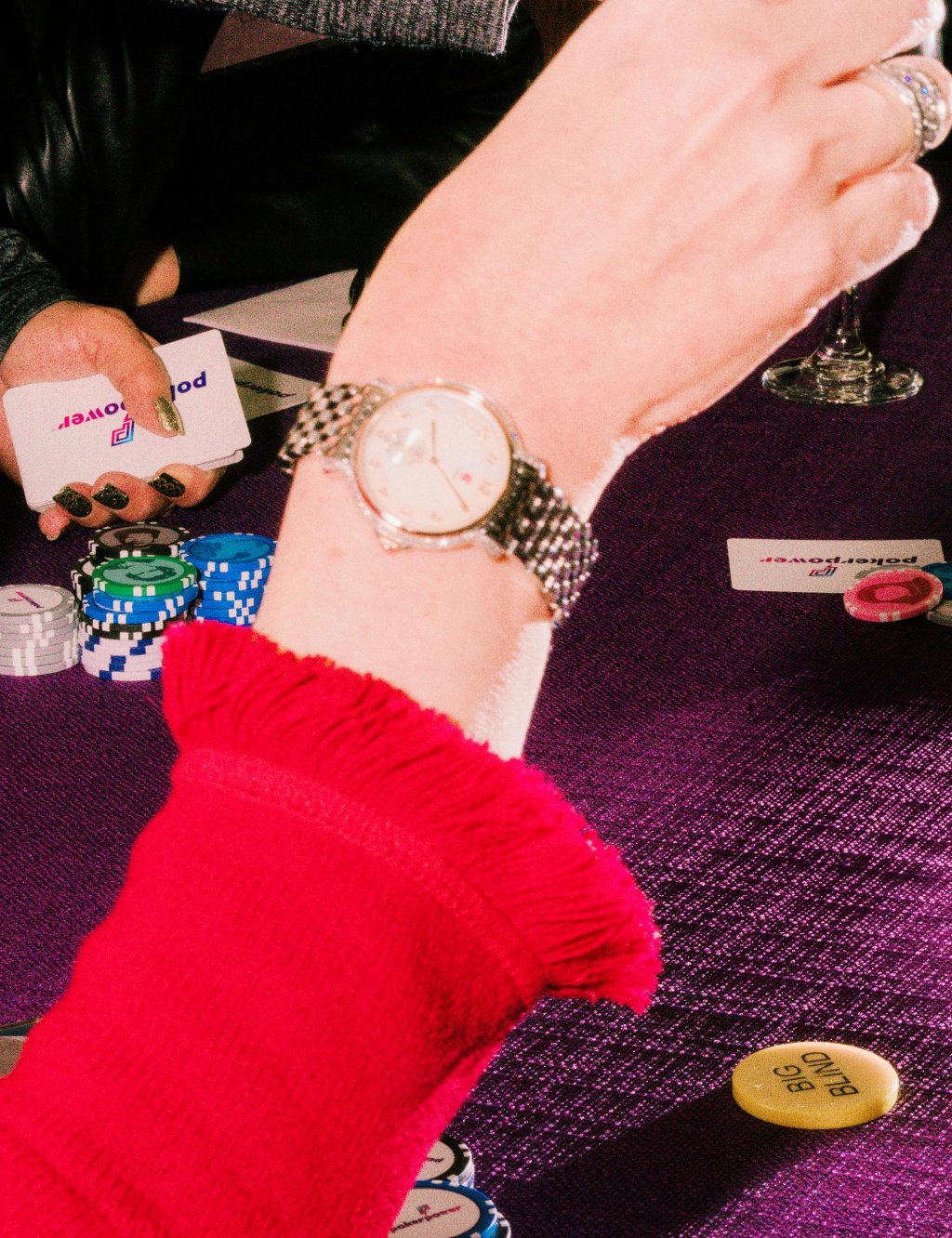
For much of Just’s career, she has tried to get women more comfortable around money. Studies have shown that women feel less competent when it comes to finances and are more risk-averse investors, although their performance as traders is equal or better than men’s in the long run. Tired of getting thousands of applications for entry-level positions at Peak6 from men and hardly any from women, Just set up a summer “Trading Experience” camp for undergraduate women about seven years ago. “All we do is show them that if you’re hardworking, you’re curious, and you’re smart, [options trading] can be a great career,” she says. Learning poker was a way of filling time between trading activities for the campers.
The inspiration for teaching teen girls poker arose, as so many revolutions do, from a marital disagreement. In mid-2019, Hulsizer was watching their youngest child, Juliette, lose at tennis and noticed she was reacting to her opponent rather than trying to anticipate her moves. In his frustration he vented to Just that Juliette, then 14, needed to learn how to play poker—which neither he nor his wife played seriously. Just found herself hesitant about her daughter learning the game, and had the epiphany that she would feel no such reluctance about her three sons.
So she organized a few lessons for friends’ and colleagues’ daughters and was surprised at the change. Within a few weeks, they went from giggling and sharing chips to competing. “They were taught to win,” says Just. “It may not have been natural, but it was easily taught.” She began to learn poker too, and noticed that she started using poker analogies at work. Then Hulsizer started taking lessons. With the enthusiasm of new converts, they decided to make it a more formalized part of the Trading Experience for interns. After a while, some of the traders asked if they could be taught too.
Poker Power, which Just cofounded with Juliette, provides a bunch of ways to learn and practice the game. It has developed an app that offers lessons, the ability to practice against a computer, and community games, and the organization also offers classes via Zoom, and occasionally holds in-person events with poker professionals for businesses and their clients, or high school girls. None of the events use real money. Each set of four 60-minute Zoom group classes costs $50, although the curriculum has been extended to schools free of charge. Just says she’s prepared to spend “whatever it takes” to make the business a success.
Part of the value for girls is what Just calls “compound experiences” of failure, so, as with compound interest, they can take on bigger challenges as they learn from losing at the poker table. “If I don’t have those experiences of trying and failing and taking a risk and failing again, it gets harder and harder as I get older,” says Just. “I always say: if I had poker, I would have taken 10 years of fails out of my career.”
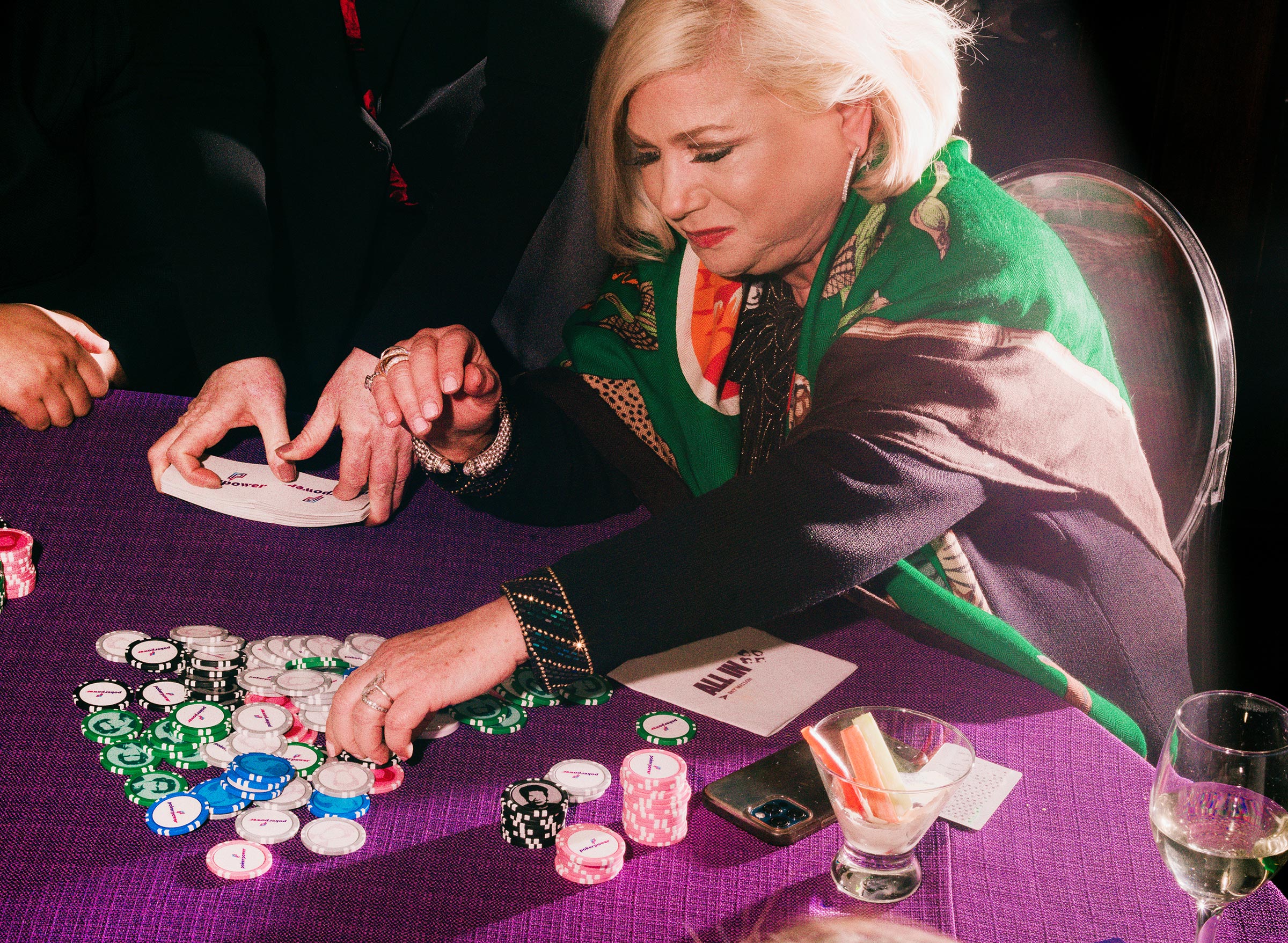
At a Poker Power event hosted by BNY Mellon in the former card room of the New York Stock Exchange on International Women’s Day in March, the mood is jubilant. There are cheers and groans as women in business casual try to learn the finer points of Texas Hold’em. After a quick motivational speech by Just, Poker Power’s director of education and technology, AJ Rudolph, gives a brief seminar on what hands have the strongest potential, how much to bet, and such poker jargon as the hole cards (the two cards they’ve been dealt), the flop (the first three cards laid on the table), the turn and the river (the last two table cards, respectively). Poker experts then fan out to each table to deal a few hands for the attendees.
Played well, poker is an aggressive game, and the women are coaxed into doubling and tripling the pot, even before the flop. Their appetite for risk has been amplified by free poker chips bearing the faces of such pioneering women as Malala Yousafzai and Frida Kahlo, strict instructions on when to bet, and possibly the open bar. On the surface, the event seems like any other networking event of mid-level executives looking for a mildly buzzed girls’ night out, gussied up with some Girl Power trimming.
But the lessons of the evening are persuasive enough that Jen Hensley, 44, a vice president at Con Edison, decided to play a few hands of poker with her three daughters the following weekend. They’re 7, 9, and 12, but why not start early? “At my prior job, my boss was a very serious amateur poker player. It was a very clear part of his leadership style,” she says. “And I always thought that was unrelatable. So when I first got the invitation, I was like, ‘Oh, this is not for me.’” A friend talked her into it, and when she got there, she began to wonder why she had imagined it would be intimidating. “This idea of really calculating risk is something that I do in my leadership role, without really thinking about it,” she says.
Hensley found betting chips a useful proxy for making decisions. “I have been thinking a lot about how you accelerate that rate of change and thinking about risk in that way is helpful,” she says. As the family breadwinner, however, she thinks it might feel different if there were real money on the table. Annie Duke concurs. “[The chips] get you to be caring about the strategy and the way that you’re executing, and not care so much about the money,” she says. “When you care about the money, that causes you to be risk averse.” She adds, however, that poker is also not really fun until you’re playing for an amount that matters. Even Just, who regularly risks millions of dollars as part of her workday, admits that the only time she has played poker for real money, she thought her heart would beat right through her chest. “It hurt. It hurt!” she says.

For all Just’s enthusiasm and commitment, it is not 100% clear that she has found the cure for the ills she’s trying to address. There are a bunch of very solid reasons women don’t want to play poker. The link between an appetite for risk and testosterone is well-established, and thus the places where people play poker are still notoriously bro-ish. Duke was constantly being asked why she wasn’t home looking after her kids, or if she was spending the grocery money. (And those were the printable questions.) Aggression and ambition are still not seen as likable qualities in women. “We have young high school girls who get really confident playing with us, and they want to play with the boys,” says Just. “And the boys will then be mad when they lose to the girls—but they don’t mind if they lose to the boys.”
Nobody knows for sure that the skills learned at the poker table translate into real life. In fact, playing poker has had a negative effect on many lives. According to Keith Whyte, executive director of the National Council on Problem Gambling., about 2% of people who gamble regularly develop a compulsion for it. And the qualities Just wants to inculcate in girls are exactly the ones that can lead to gambling problems, he says: “Being able to divorce yourself from the impact of losing that money is probably a great thing in lots of other areas. In gambling it’s associated with greater rates of addiction.”
Poker Power has some highfalutin claims about what poker can teach women, including how to be more fearless, confident, influential, perceptive, cool-headed, and resilient, but little in the way of scholarship to back up those claims. Studies suggest that good poker players have some of those qualities—especially cool-headedness—and that skill at poker can be learned. Whether those skills kick in when they’re needed has yet to be proved. (Poker Power is in discussions with a few prominent business schools about studying the benefits of the game this fall.) But even if women can be trained to be more aggressive, it’s an open question as to whether that’s a net positive on a trading floor, which already has plenty of alpha-personalities, and might benefit from a different style of thinking.
It’s also unclear that society needs more people who are really good at getting other people to believe something that may or may not be true—and to make high-risk decisions based on that belief. (Conversely, however, in an era of increasing disinformation, the ability to spot that kind of bluff might become ever more important.) Just acknowledges that poker has its dark side, but says she’s willing to take that chance to see women become more confident in assessing risk, especially as we enter an era in which such new tools as cryptocurrency and A.I. are pushing humans into unknown territory.
One of Just’s favorite sayings is “Money isn’t everything, but everything is money.” It makes sense, with that worldview, that she believes a strategy game involving dollars and decisions is a powerful weapon in the redistribution of institutional power. But it seems a long way from the problems that most people think keep women down, like the lack of affordable childcare or maternal mortality. By investing her time and money in poker, rather than a more obvious issue, Just is wagering on an unlikely contender. Sometimes those bets are made merely to garner attention. And sometimes they pay off the most.
Correction, July 25
The original version of this story misstated the number of people in Just’s family of origin. It is seven, not six.
More Must-Reads From TIME
- The 100 Most Influential People of 2024
- Coco Gauff Is Playing for Herself Now
- Scenes From Pro-Palestinian Encampments Across U.S. Universities
- 6 Compliments That Land Every Time
- If You're Dating Right Now , You're Brave: Column
- The AI That Could Heal a Divided Internet
- Fallout Is a Brilliant Model for the Future of Video Game Adaptations
- Want Weekly Recs on What to Watch, Read, and More? Sign Up for Worth Your Time
Contact us at letters@time.com
